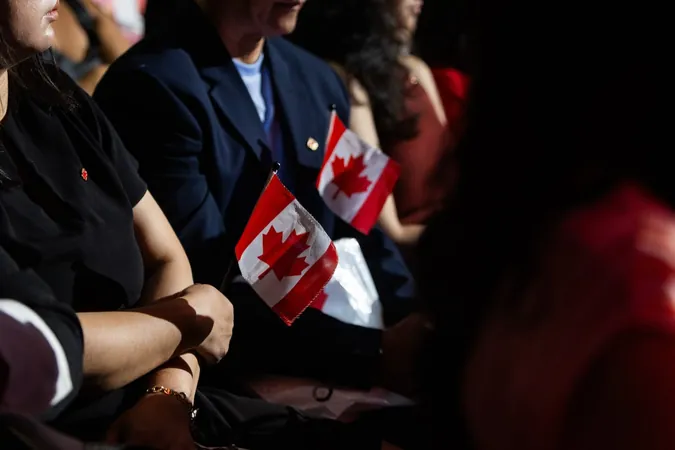
Canada's Immigration Cuts: A Potential Economic Nightmare with Billions at Stake!
2024-12-04
Author: William
Introduction
Canada's federal government’s move to significantly reduce annual immigration quotas is poised to trigger a severe financial fallout, costing the country an estimated $50 billion in lost revenues over the next five years, as revealed in a recent comprehensive report by the Royal Bank of Canada (RBC). This alarming forecast urges caution from the government, especially as Finance Minister Chrystia Freeland prepares for the anticipated fall economic statement.
Economic Impacts of Reduced Immigration
RBC economists Cynthia Leach and Rachel Battaglia underscore that a decrease in immigration will not only negatively impact consumption patterns but also hinder employment growth across various sectors. With fewer immigrants contributing to the economy, the overall federal financial landscape is expected to deteriorate, resulting in profound implications for public services and programs reliant on stable revenue.
Adherence to Fiscal Targets
Leach, who previously served in the federal Finance Department, insists that the government must adhere to its predetermined fiscal targets to maintain a sustainable deficit and prevent surging national debt. "It's crucial for the government to uphold its fiscal anchors," she cautions.
Broader Economic Uncertainties
The implications of these immigration changes come during a time of broader economic uncertainty, particularly with the ongoing discussions around potential tariffs initiated by the incoming U.S. president. The RBC report projects that while a slight fiscal improvement—estimated at around $30 billion—may arise from lower-than-expected interest rates, it will hardly counterbalance the projected revenue shortfall.
Policy Changes Announced
In a significant policy shift, Prime Minister Justin Trudeau announced plans to scale down the number of permanent residents from a target of 500,000 in 2025 to 395,000. Future years are expected to see further reductions, with numbers dropping to 380,000 in 2026 and 365,000 in 2027. The government is also looking to cut back on temporary residents, including international students and work permit holders.
Political Climate and Fiscal Accountability
Despite the forecasted economic downturn, the government has yet to release a date for the fall economic statement amidst a contentious political climate marked by opposition resistance regarding transparency in government spending.
Concerns from the Parliamentary Budget Officer
Adding to the tension, Parliamentary Budget Officer Yves Giroux has voiced his long-standing concerns regarding the delay in the release of end-of-year fiscal results. He advocates for timely information to assist Members of Parliament in assessing ongoing spending estimates. His recent findings suggest that the fiscal year 2023-24 is on track for a $46.8 billion deficit, exceeding the government’s initial target.
Government's Confidence and Policy Critique
As the Liberal government seeks to navigate these financial waters, Freeland maintains confidence in Canada’s fiscal standing, affirming, "Canada does have a strong fiscal position." Recent initiatives aimed at bolstering the economy, such as a temporary Goods and Services Tax (GST) holiday and direct payments to working Canadians, are under critical scrutiny. The RBC report warns that such demand-side policies may not address the root problems and could unintentionally exacerbate inflation.
Conclusion
As Canada grapples with the implications of reduced immigration, experts are urging the government to reconsider its stance—before it’s too late. Will policymakers respond to these warnings, or are billions in lost revenue a foregone conclusion? Stay tuned for updates!









 Brasil (PT)
Brasil (PT)
 Canada (EN)
Canada (EN)
 Chile (ES)
Chile (ES)
 España (ES)
España (ES)
 France (FR)
France (FR)
 Hong Kong (EN)
Hong Kong (EN)
 Italia (IT)
Italia (IT)
 日本 (JA)
日本 (JA)
 Magyarország (HU)
Magyarország (HU)
 Norge (NO)
Norge (NO)
 Polska (PL)
Polska (PL)
 Schweiz (DE)
Schweiz (DE)
 Singapore (EN)
Singapore (EN)
 Sverige (SV)
Sverige (SV)
 Suomi (FI)
Suomi (FI)
 Türkiye (TR)
Türkiye (TR)